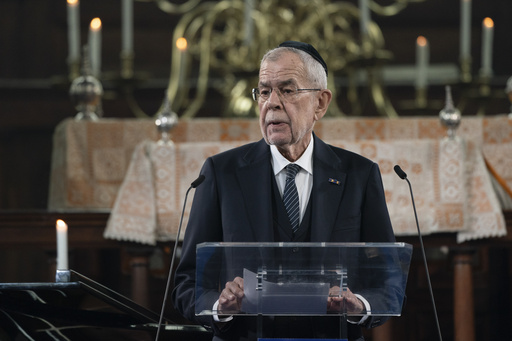AMSTERDAM (AP) — The Netherlands opened the National Holocaust Museum on Sunday with a ceremony presided over by the Dutch king as well as Israeli President Isaac Herzog, whose presence prompted protest because of Israel’s military campaign in Gaza.
The museum in Amsterdam tells the stories of some of the 102,000 Jews who were deported from the Netherlands and murdered in Nazi camps, as well as the history of their structural persecution under German World War II occupation before the deportations began.
The museum “gives a face and a voice to the Jewish victims of persecution in the Netherlands,” the Dutch King Willem-Alexander said in the address at the inaugural ceremony on Sunday. It also “shows us the devastating consequences that antisemitism can have,” he added.
“That is why we must continue to be aware of how things began and how they went from bad to worse,” the king said. Earlier, the king and the Israeli president visited Amsterdam’s famous Portuguese Synagogue.
Herzog hailed the Netherlands’s initiative to create a new Holocaust museum amid what he said was raising antisemitism around the world.
“At this pivotal moment in time, this institution sends a clear powerful statement,” Herzog said. “Remember! Remember the horrors born of hatred, antisemitism and racism, and never again allow them to flourish.”
Sunday’s ceremony came against a backdrop of Israel’s devastating attacks on Gaza that followed the deadly incursions by Hamas in southern Israel on Oct. 7.
Thousands of pro-Palestinian protesters gathered amid tightened security at the Waterloo Square in central Amsterdam, near the museum and the synagogue, waving Palestinian flags, chanting “Never again is now,” and demanding an end of Israeli occupation of Palestinian territories and an immediate cease-fire in Gaza.
The protest leaders emphasized they were against Herzog’s presence, not the museum and what it commemorates.
“For us Jews, these museums are part of our history, of our past,” said Joana Cavaco, an anti-war activist with the Erev Rav Jewish collective, addressing the crowd ahead of the ceremony. She added: “How is it possible that such a sacred space is being used to normalize genocide today?”
Three-quarters of Dutch Jews were among the 6 million Jews murdered by the Nazis.
Herzog was among Israeli leaders cited in an order issued in January by the top United Nations court for Israel to do all it can to prevent death, destruction and any acts of genocide in Gaza. He accused the International Court of Justice of misrepresenting his comments in the ruling. Israel strongly rejected allegations leveled by South Africa in the court case that the military campaign in Gaza breaches the Genocide Convention.
“I was disgusted by the way they twisted my words, using very, very partial and fragmented quotes, with the intention of supporting an unfounded legal contention,” Herzog said, days after the ruling.
A pro-Palestinian Dutch organization, The Rights Forum, called Herzog’s presence “a slap in the face of the Palestinians who can only helplessly watch how Israel murders their loved ones and destroys their land.”
In a statement issued ahead of Sunday’s opening, the Jewish Cultural Quarter that runs the museum said it is “profoundly concerned by the war and the consequences this conflict has had, first and foremost for the citizens of Israel, Gaza and the West Bank.”
It said that it is “all the more troubling that the National Holocaust Museum is opening while war continues to rage. It makes our mission all the more urgent.”
The museum is housed in a former teacher training college that was used as a covert escape route to help some 600 Jewish children to escape from the clutches of the Nazis.
Exhibits include a prominent photo of a boy walking past bodies in Bergen-Belsen after the liberation of the concentration camp, and mementos of lives lost: a doll, an orange dress made from parachute material and a collection of 10 buttons excavated from the grounds of the Sobibor camp.
The walls of one room are covered with the texts of hundreds of laws discriminating against Jews enacted by the German occupiers of the Netherlands, to show how the Nazi regime, assisted by Dutch civil servants, dehumanized Jews ahead of operations to round them up.
The museum brings to life the stories of people who were “isolated from the rest of Dutch society, robbed of their rights, denied legal protection, rounded up, imprisoned, separated from their loved ones and murdered,” the Dutch king said.
____
Barbara Surk contributed from Nice, France. Associated Press writers Mike Corder in Amsterdam and Melanie Lidman in Tel Aviv, Israel, contributed to this report.




